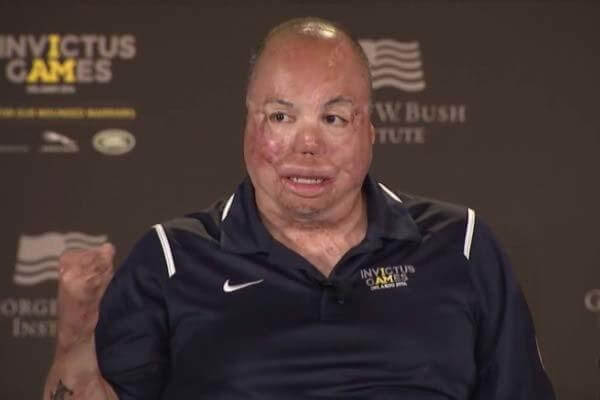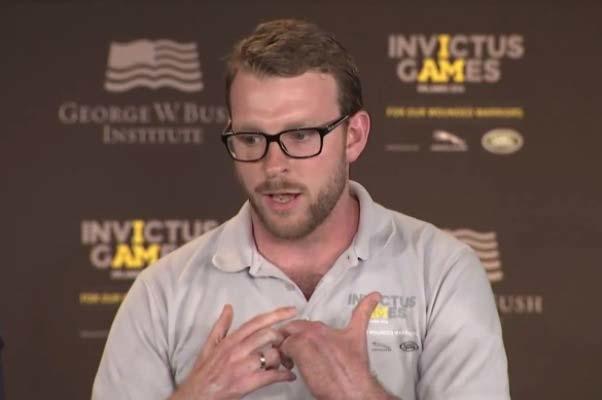The first Invictus Games to be held in the United States kicked off this week in Orlando with an emphasis on raising awareness about the invisible wounds of war, organizers said.
The games -- a Paralympic-like event for wounded veterans to compete in such sports as basketball, volleyball and indoor rowing -- were created by Prince Harry, whose real name is Henry Charles Albert David, and previously held in 2014 in London.
During a press conference on Sunday with former U.S. President George W. Bush and wounded veterans, the 31-year-old British prince and army veteran who served multiple tours of duty in Afghanistan as a helicopter pilot, said he wanted to raise awareness about invisible combat injuries.
"The Invictus Games in 2014 in London … smashed the stigma around physical injuries," he said. "What I really hope is that for Orlando that we can do the same for invisible injuries."
Harry said most of the veterans he has talked to at the Wellington Barracks, a personnel recovery center in London, and other hospitals agree that treatment for such conditions as post-traumatic stress disorder, depression and anxiety is more effective the earlier it begins.
"If you can deal with it soon enough and actually have the ability and the platform to speak about it openly, then you can fix these problems," he said. "And if you can't fix them, then you can at least find coping mechanisms. That's what it's all about. There's no reason why people should be hiding in shame after they've served their country."
Bush said he wants to assist veterans transitioning from the military to the private sector -- and that the games will send a message to those struggling with psychological wounds that it's OK to seek help.
"You were courageous before you got hurt, you're courageous now and seeking help is a sign of courage," he said. "You'll hear some interesting discussions about what works and what doesn't work, and how do we make sure that which works is available for as many vets as possible."
The George W. Bush Institute website notes 71 percent of Americans say they have little understanding of the issues facing veterans who served in the period after the Sept. 11, 2001, terrorist attacks -- and a similarly large share of vets -- 84 percent -- say the public has "little awareness" of the issues facing them and their families.
The figures highlight the issues that "can make transition a challenge for veterans as well as for the employers who want to hire them, the universities that want to educate them, and the families and communities that want to help reintegrate them," it states.
The prince and the former president appeared alongside two wounded veterans of the war in Afghanistan -- one American, one British: U.S. Air Force Master Sgt. Israel Del Toro Jr. and British Royal Marine Reservist Lance Cpl. John James "JJ" Chalmers.
Del Toro was riding in a truck in Afghanistan in 2005 when it was struck by a roadside bomb, known as an improvised explosive device, or IED. Flames engulfed the vehicle, burning more than 80 percent of his body. But he persevered, underwent rehabilitation and became the first 100-percent disabled veteran to re-enlist in the Air Force.
"It's important to address those visible wounds, but sometimes they forget about what's going on in my head and they just focus on these things," Del Toro said of health care providers. "My family dealt more with my invisible wounds … because I would try not to show it.
"I come from a career field where we're alpha -- we have that alpha complex -- and we don't want to let people think that we're hurt mentally because we want to show that we can still do the fight and do what we do," he added. "So we hide it."
Chalmers, a native of Edinburgh, suffered extensive injuries to his arms -- he lost two fingers on his left hand and his right elbow was shattered -- when his vehicle was attacked by an IED in Afghanistan in 2011. His right arm was saved in part by a medical procedure in which surgeons temporarily grafted the limb to his stomach.
"It's a simple fact -- I was caught in the center of the blast and then there's a ripple effect that comes out from that and you're touched by it or not," he said.
Others in his unit were killed, Chalmers said.
"I was in many ways lucky," he said. "I was taken out in a helicopter and woken up in a hospital bed and then received the care I needed."
But Chalmers pointed out that the survivors of the incident had to continue on with their job "and things only got worse in many respects."
What's more, he said, "they came home and they can look at us and it's very obvious that we require support and we require adaptations and all the other things. And then they look at us and, tragically, they place themselves at the bottom of the pile by going, 'He's wounded and he needs help. There's nothing wrong with me, I don't require help.'
Chalmers said, "And that's when I look at it the complete opposite. I consider myself extremely lucky that, yes, I came back from Afghanistan broken physically, but mentally I was still the same person that went to Afghanistan and came back.
"And that was more or less either a stroke of luck or that I was lucky enough in hindsight, this is, to have done the right things at the early stages," he said, "to have had a great support network, my family, my wife now, and a few people along the way, that if I hadn't had just some casual conversations, there's a good chance I wouldn't be sat here doing this now."
-- Brendan McGarry can be reached at brendan.mcgarry@military.com. Follow him on Twitter at @Brendan_McGarry.





























